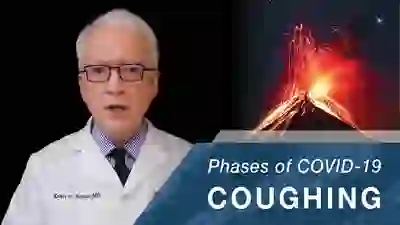Still Coughing After COVID-19?
Robert W. Bastian, M.D. — Published: December 9, 2020
Introduction
Covid-19 has intruded into our lives in innumerable ways. Worst of all for some, is that they contracted the virus.
Among those stricken by the virus are surely a number of persons who are some weeks or even months past the acute infection and who feel generally well. But, they are experiencing a lingering cough. Especially early on, this cough may be continuing to clear secretions that accompany resolving lung inflammation. In that case, the lingering cough has a purpose—it is accomplishing something.
For others, the cough is no longer solving a problem, but it IS the problem. That is because for them, the infection has “damaged,” or “sensitized” sensory nerve endings in the trachea, larynx, or throat. These “wild” nerve endings go “ZING!!” and demand that you cough.
Such persons may have developed a condition called sensory neuropathic cough (SNC).
Key features of SNC are:
- Each episode of coughing (whether a single cough, a few seconds of coughing, or a violent and protracted 30-second or longer attack) is initiated by a stereotyped sensation: a “tickle,” “dry patch,” “itch,” “pinprick,” “dripping sensation,” etc. Commonest location is at the sternal notch—the lowest part of the neck before you reach the sternum.
- The cough is out of proportion to anything produced by that cough. The cough is dry, or it produces mucus only after hard coughing. The person says, “Who coughs this much to produce that much mucus?” The person may even cough hundreds of times a day, mostly briefly, but also have agonizing protracted and exhausting episodes a few times a day … to the point of embarrassment or even humiliation when they occur in public.
- Trigger phenomena. While coughing spells can occur spontaneously, certain actions make it more likely that you will cough. Things like talking, a loud laugh, breathing in air either colder or warmer than ambient (going outside, etc.), a strong odor, swallowing, change of position (such as when getting in bed or getting up in the night). Or touching a certain spot on the neck, and most commonly again at the sternal notch.
- Seeming futility of usual treatments. Taking an expression from the classic film, Casablanca, “rounding up the usual suspects” of allergy, acid reflux, and asthma is pointless. Steroids may help but only while on them. Narcotic cough suppressants may provide some relief, but are purely a symptomatic treatment.
- The correct approach is to target the irritable nerve endings. Things like amitriptyline (or desipramine), gabapentin, citalopram, mirtazepine, venlafaxine, capsaicin spray, etc. Usually one of the first two is effective. Persons with resistant cases may need to work their way down a longer list of medication trials. Occasionally, injection of a long-acting local anesthetic (mepivacaine, bupivacaine, or similar) combined with a locally-acting steroid (triamcinolone or similar) into a sensitized area can help.
What are the practicalities of getting help for a “Covid-19 Cough?” Some ideas:
- If really early after the infection and the cough is congested and productive, stay the course of conventional Covid-19 treatments, possibly including steroids and standard cough suppressants.
- If the infection was weeks ago; you are feeling reasonably well; and the main impediment to recovery and return of quality of life is your cough, educate yourself more fully about sensory neuropathic cough. Laryngopedia.com has many articles, videos, patient interviews, etc. that you can find by typing “cough” into the search window. Or read this article on the subject. It is a peer-reviewed article found in an open-source medial journal (that is, not behind a paywall).
- Raise the question with your personal physician. Consider providing the above article for his or her perusal, since your doctor may not have encountered this diagnosis before. The treatment protocol is clearly outlined.
- Call nearby ENT or pulmonary doctor groups in particular and ask to speak to the triage nurse.Ask him or her “Do any of your doctors treat sensory neuropathic cough?” If “crickets,” call the next group with the same question.
- If you exhaust all local sources of help, consider a teleconversation with Laryngopedia.com, or with a Bastian Voice Institute physician. Doctors there would also be glad to help you in person, if convenient for you.
Conclusion
Here’s wishing you speedy resolution of your cough, maybe as a brief aftermath of Covid-19. This information is offered just in case you struggle with coughing that won’t go away after many weeks, and despite many tests and treatments. If, as it appears, SNC has for all of human history been “caused” in many cases by endemic viruses, why not by a novel one like Covid-19?
